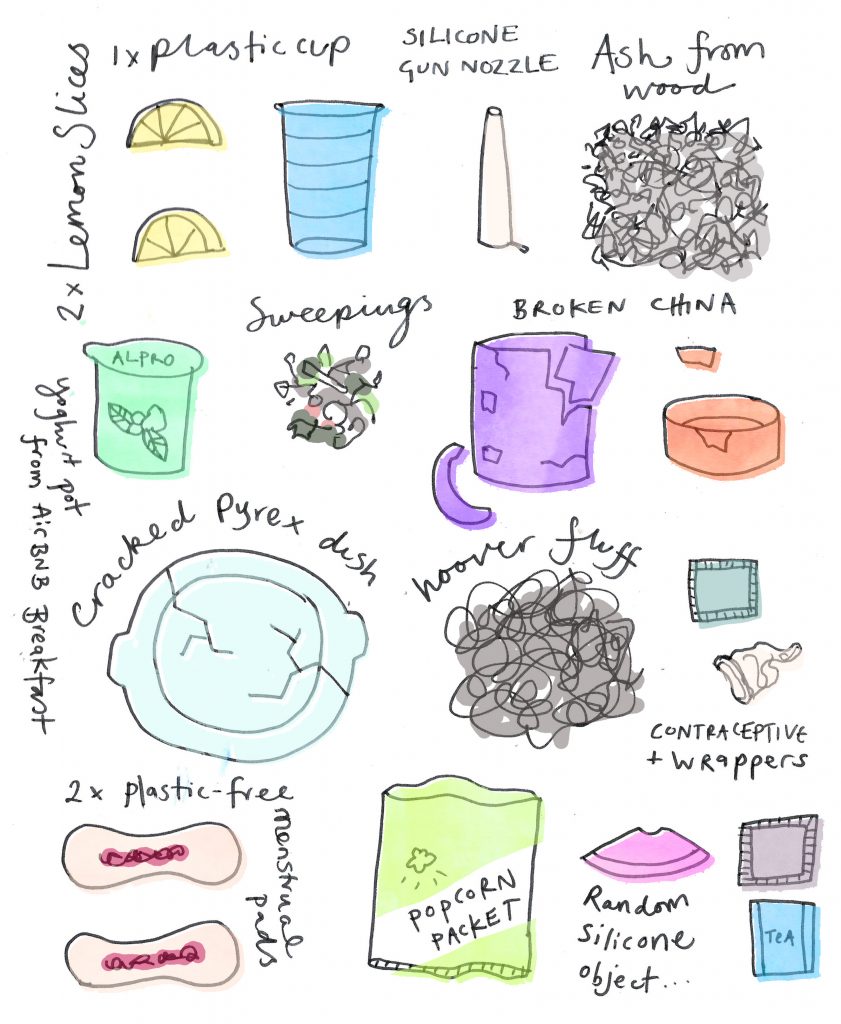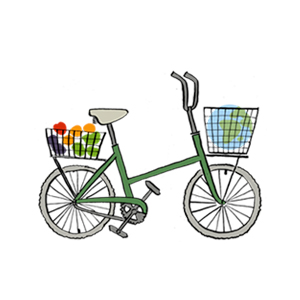
Do you know where things actually go when you throw them away? Until last year I didn’t have a clue what happened to my rubbish after it had left the wheelie bin. I assumed that everything that went into my bin was buried somewhere in a landfill site, so was surprised to find out that some waste from the UK (including mine) is incinerated abroad.
In West Wiltshire, the contents of our black wheelie bins are collected by Hills Waste, who process it at a plant near Westbury. “Each year 60,000 tonnes of Wiltshire’s household waste is processed using mechanical and biological treatment (MBT) to create solid recovered fuel (SRF) for use in renewable energy plants. The Northacre Resource Recovery Centre is operated by Hills Waste Solutions under a 25 year contract agreed withWiltshire Council” The SRF is baled and transported by road to Germany where it is incinerated to generate energy. Hills Waste are planning to build an incinerator in Wiltshire and there is stong local opposition. I signed the petition and filled in the planning survey to oppose the incinerator, but wonder if I’m a hypocrite: If waste is going to be burned somewhere, why not burn it near where it is made? Could I be accused of [gasp] NIMBYism? A better solution is to not generate any waste, so when I heard about the Wiltshire Wildlife Trust’s Waste Free February challenge, I signed up.
My household consists of 2 x 40 year olds, 1 x 4 year old and one cat. How on earth could we manage to not generate any waste for a whole month? Luckily Waste Free February is flexible and you can set your own challenge. I decided my challenge would be to reduce what went into the household bin to as little as possible.
My Waste Free February started with a trip to Bath, with a bag full of containers. I visited Harvest on Walcot Street to stock up on packaging free food. Zero-waste shops are popping up all around the country, but if you haven’t got one close there are a number of online options. We get our organic fruit and vegetables delivered by Riverford*, who use paper bags for most of their produce and collect all their packaging the following week.
To minimise my rubbish, I educated myself on exactly what could be recycled. It’s possible to recycle lots of things in addition to your council run recycling schemes. Here are some ideas:
- Larger supermarkets usually have a plastic bag recycling facility which takes the following items: Carrier bags, bread bags, breakfast cereal liners, shrink wrap and joiners from multipacks of water or cans, frozen food bags, dry cleaning bags, magazine and newspaper wrappers, fruit and veg bags, bubble wrap, Low-density polyethylene resin ID code 4
- If your council only takes plastic bottles, supermarket carpark recycling facilities may take rigid plastics such as yoghurt pots and food trays.
- Lush accepts black plastic lids for recycling, you can even send them for free via FREEPOST LUSH GREENHUB (lots of councils won’t take black plastic because the lasers used for sorting can’t see it!)
- Terracycle are a private company who offer lots of free recycling schemes. Their website has a map facility where you can search for your nearest drop-off points. Anyone can join Terracycle for a free postal recycling service for contact lens equipment, toothbrushes and dental care, cosmetic packaging and more. Use their website to find Terracycle collection points for: pens, crisp packets, pet food pouches, contact lens equipment, toothbrushes and dental care, baby food pouches, cosmetic packaging, coffee pods, household cleaners and more. Find them online at https://www.terracycle.co.uk/en-GB/brigades
- Terracycle also have ‘paid-for’ recycling boxes. I ordered a Plastic Packaging recycling box for plastic film and packaging which the council and supermarket facilities won’t take. It was over £100 but I aim to make it last for a very long time! https://www.terracycle.co.uk/en-GB/zero_waste_boxes.EcoBricks are another option for disposing of plastic packaging. Find out more at https://www.ecobricks.org/ I am a sceptic because I’m concerned about the long term safety of plastics and potential toxic pollution. What if there was a fire in a building made from EcoBricks?
- Next to our compost pail we keep an old pot to collect waste that we call ‘burnables’. This includes used tissues, greasy paper bags and scraps of cooked food waste. When the woodburner is going well, chuck it in and it burns even if it’s a bit damp!
- The Recycle Now website has a huge list of items with ideas on how to dispose of them. See https://www.recyclenow.com/what-to-do-with
With these steps in place, I limited my rubbish to the following items:
Broken China, Glass and Pyrex I don’t normally break this much crockery, but during February I smashed three things. If it was something I really loved, I’d consider a Kintsugi mend, but gold would be wasted on the mug and ramekin that were broken.
Ash, Dust and Sweepings When I lived on a narrowboat, I used the ash from my burner to fill in puddles on the towpath, or chucked it into the hedge. Nowadays, I’ve only got a tiny garden. Following the advice of the Royal Horticultural Society, I decided it was best not to cover it with ash, and alter the pH levels. Sending ash to be incinerated abroad seems utterly ridiculous, and I’d love to find another option. Dust and sweepings from our house usually includes cooked food from under the high chair, and random sequins/googly eyes/rubber bands and scraps from children’s craft activities, meaning it isn’t suitable for composting either.
Menstrual Products I usually use washables, but this month I was travelling during the last days of my period and didn’t fancy carrying used cloth pads around with me. Instead used a couple of natural, organic cotton pads from TOTM*. Read my guide to plastic free periods here.
Contraceptives Although I use natural fertility awareness for ‘family planning’, it’s nice to have a bit of flexibility occasionally, and Fairsquared vegan condoms* are a good solution. As they are made from Fairtrade natural rubber they could probably be composted, but we share a heap with a neighbour so it’s not a good idea!
Teabags and Sachets At home I am a loose leaf fanatic, but when I spent the night in an AirBnB I used a teabag [shock, horror!]. If you are wondering why teabags can’t go in the compost please read my post here. Teabag sachets may look like paper, but most actually contain a thin layer of plastic to keep them sealed, so they can’t be recycled.
Silicone Gun Nozzle, Random Silicone Object The building work last summer generated a lot of waste. Hopefully this is the last of it!
Popcorn Packet, Sliced Lemon, Plastic Cup I’ve travelled overnight a few times this month, and mostly carried all my food packaging home for recycling, but I slipped up on a couple of occasions:
1. G&T in a plastic cup whilst watching a play about the miner’s strike, 156 miles from home. Teabag and yoghurt pot from breakfast the following morning.
2. I ate some popcorn in the minibus home from End Deportations protest at the Stansted 15 sentencing. I had forgotten that the Terracycle Crisp Packet Recycling Scheme doesn’t take popcorn packets, but have just found out that they are launching a new scheme with KP snacks that does, so I’ve fished it out of the bin!
TOP TIP: travel with a bag to take your waste home. It isn’t always possible to find recycling or composting opportunities when you’re out and about, so make sure to have something to carry that banana skin home in!
So, was it a rubbish idea? I’ve learned a lot by taking part in Waste Free February and I will definitely carry on with my attempt to have a ‘zero-waste’ household. If you’re a sceptic I recommend reading this article by the Zero Waste Chef. My next challenge is to find an alternative for ‘burnable’ waste during the summer months… any ideas?
*Affiliate links are marked with an asterisk. If you buy anything after clicking on one of these, a teeny-tiny percentage goes to support the running costs of my website at no extra cost to your lovely selves.

If you have a firebowl or similar outdoors, or have a barbecue, “burnable” waste could go on that.
PS – Very useful post, thank you!
Thank you! I love having a fire outdoors… perhaps this year I will find an old washing machine drum to make a brazier ?♻️
This is such a great resource, thanks!
A very inspiring and useful post! What I find frustrating about the incineration is not the fact it happens (I think it is possibly a good idea to make fuel from waste rather than putting it in landfill) but the fact that councils are pushing it because it counts in their recycling quotas! Recycling, I don’t think so…
The Quirky Queer
Thanks Izzy!
My Doctor’s surgery accept inhalers for recycling.
I’ve just found out that our local health centre does too! Thanks for the tip 🙂